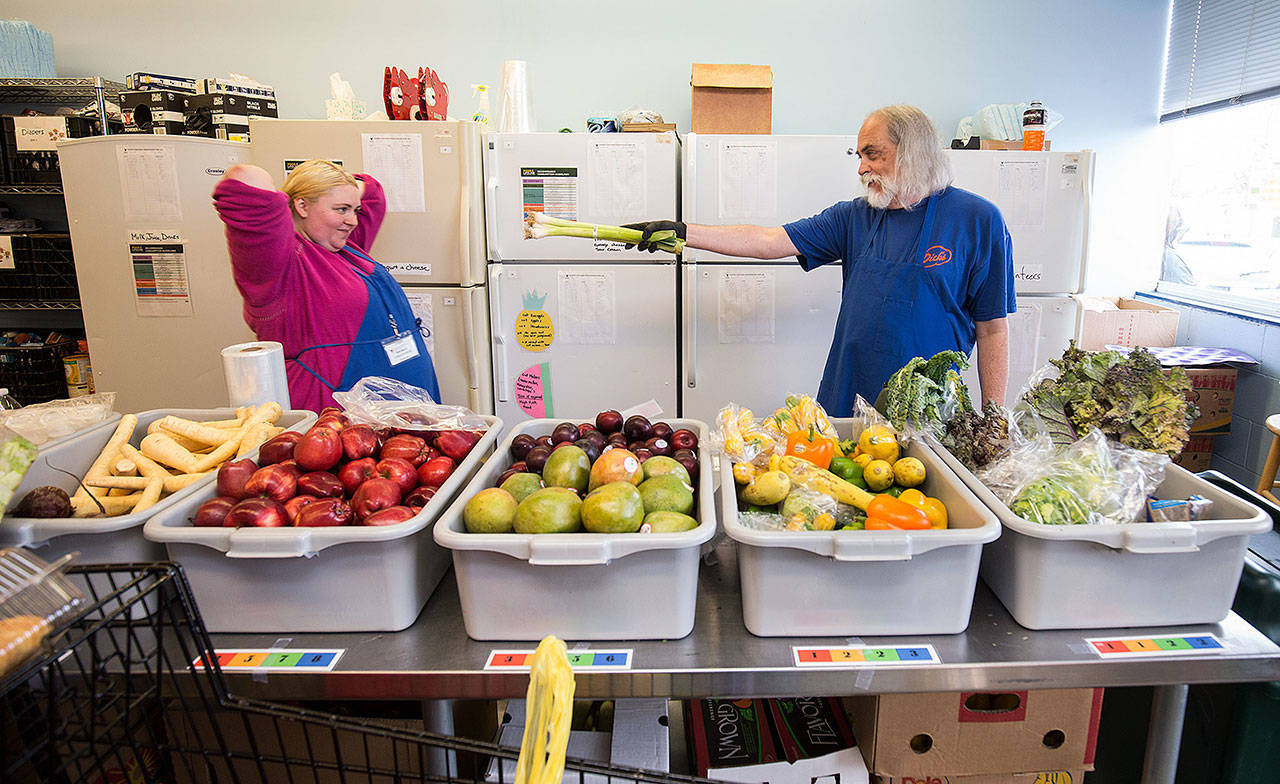By The Herald Editorial Board
It should surprise no one that this is a particularly tough time for the food banks that provide vital assistance to families in Snohomish County and throughout the state.
Not only are many food banks trying to meet an overwhelming need — as more families struggle with layoffs or reduced pay — donations also have declined by as much as 70 percent, according to statewide estimates.
On the supply side: Food banks, in addition to donations from people in the community, also rely heavily on restaurants and grocery stores who donate food or sell their surplus at reduced rates. But many restaurants have cut their usual orders from suppliers as their business has been reduced to curb-side pick-up and delivery and have less surplus to offer; and grocery stores have struggled to keep their shelves filled because of increased demand.
On the demand side: Even before the coronavirus pandemic — and the business closures that followed the state’s necessary “Stay Home, Stay Healthy” social-distancing orders, some 650,000 Washington residents were collecting unemployment benefits. Since early March, that number has more than doubled to 1.45 million, and of the 800,000 additional people filing claims, a third of those — 280,000 — have yet to receive jobless benefits because of the backlog from the increased demand as their eligibility is confirmed.
That financial hit to families has meant an estimated 1.6 million people in the state — double the usual number — are expected to turn to their community food bank for help, according to officials with the state departments of Agriculture and Financial Management, who discussed the growing degree of food insecurity in the state last week at a news conference.
Food banks have long relied on state and federal assistance to supplement donations from individuals and others, but even those funds may not be enough to fulfill the need. Derek Sandison, the state’s agriculture director, said the state is spending about $5.5 million a week in support of about 500 food banks across the state, according to a report by The Stranger. That demand will quickly exhaust an additional $10 million that the state Legislature approved at the beginning of the crisis. And there’s $6 million a month coming in federal assistance at the end of this month, which Congress approved last month.
But an additional $11 million is necessary to come close to meeting the expected need; that’s where you come in.
Last month, the WA Food Fund was launched by Philanthropy Northwest and Gov. Jay Inslee to encourage and facilitate donations to food banks in the state. Money donated to the statewide relief fund at philanthropynw.org/wa-food-fund will be distributed to three regional food donation organizations that supply community food banks: Food Lifeline, Northwest Harvest and Second Harvest.
As of last week, WA Food Fund had raised about $3 million.
Those who wish to donate to their local food bank directly, of course, are encouraged to do so. A list of Snohomish County food banks with information about how to donate is available through the Snohomish County Food Bank Coalition at www.snohomishcountyfoodbankcoalition.org/.
And while donations of canned goods and other nonperishables are accepted gratefully by food banks, donations of cash go much farther in meeting the need.
Cash donations are preferred because:
They’re more cost-effective for food banks, which can obtain food from suppliers, farmers and others at lower cost, and can select the particular food and other items that are most in need;
It allows the food banks to purchase fresh produce, meat and other perishable items that provide a healthier diet for food bank clients;
It helps limit food waste, by allowing the food banks to take advantage of available surplus from restaurants, stores and suppliers; and
It’s easier to keep track of the tax deduction. Congress recently adopted tax legislation that allows taxpayers to deduct up to $300 of qualified cash donation to tax-exempt public charities for 2020, and the donations don’t have to be itemized on longer tax forms.
Need a fifth reason? A donation to a food bank — or any nonprofit — would be timely during Give Big Days, today and tomorrow. GiveBig Washington — www.givebigwa.org — now marking its 10th year, is a campaign that encourages donations of money, material and volunteer time to nonprofit organizations. A search engine allows a search for a particular charity by type of organization, name, key word and ZIP code for a desired organization.
The need in our community — whether for donations of cash or kindness — will be with us for some time yet. Fortunately, we’ve seen many examples of people stepping up with encouragement and donations of time and money. Those who can manage it are encouraged to add to the good they’ve done.
Talk to us
> Give us your news tips.
> Send us a letter to the editor.
> More Herald contact information.

























